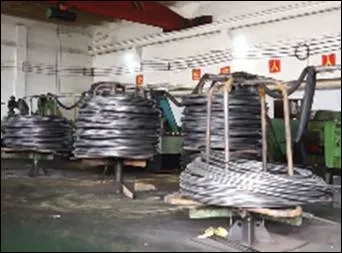Қыр . 26, 2024 05:40 Back to list
12mm anchor bolt dimensions
Understanding 12mm Anchor Bolt Dimensions A Comprehensive Guide
When it comes to construction and industrial applications, the significance of anchor bolts cannot be overstated. These essential fasteners, designed to attach structures to concrete, provide stability and strength, ensuring safety in various settings. Among the myriad of sizes available, the 12mm anchor bolt is a popular choice for many projects. This article delves into the dimensions, specifications, and applications of 12mm anchor bolts, providing a detailed overview for engineers, builders, and DIY enthusiasts.
What is an Anchor Bolt?
An anchor bolt is a threaded rod used to connect structural components to concrete or masonry. They are typically embedded in concrete during the curing process and can be used for a variety of applications, including securing machinery, supporting walls, and anchoring columns. The dimensions of anchor bolts, including their diameter, length, and thread pitch, impact their load-bearing capacity and overall performance.
Dimensions of a 12mm Anchor Bolt
A 12mm anchor bolt refers to the nominal diameter of the bolt, measuring approximately 12 millimeters or about 0.47 inches. The specific dimensions of a 12mm anchor bolt can vary depending on the manufacturer and its intended application. Here are some key dimensions and considerations
1. Diameter The nominal diameter is the primary measurement, which is 12mm. This size is often used in light to medium-duty applications.
2. Length The length of 12mm anchor bolts can vary widely. Common lengths might range from 100mm (about 3.94 inches) to 300mm (about 11.81 inches) or longer, depending on the thickness of the materials they are anchoring. Custom lengths may also be available for specific applications.
3. Thread Type and Pitch 12mm anchor bolts commonly have a standard metric thread with a pitch of 1.75mm. However, variations exist, and it’s crucial to verify the thread specifications based on the required application and nut compatibility.
4. Head Style Anchor bolts can feature various head styles, including hexagonal, square, or rounded. The choice of head style can influence the ease of installation and the types of tools required.
5. Material Anchor bolts can be made from different materials such as carbon steel, stainless steel, or other alloys. The choice of material impacts corrosion resistance and load capacity, making it crucial to select the appropriate type for the environmental conditions.
Applications of 12mm Anchor Bolts
12mm anchor bolts are versatile and can be used in various applications, including
12mm anchor bolt dimensions

- Structural Support They are commonly utilized to anchor beams, columns, and other structural elements in both residential and commercial buildings
.- Machinery Installation These bolts are often used in factories and industrial settings to secure heavy machinery to concrete floors.
- Outdoor Structures In outdoor environments, such as decks, fencing, and playgrounds, 12mm anchor bolts can provide the necessary stability against wind and movement.
- Road and Bridge Construction In civil engineering projects, 12mm anchor bolts can secure guardrails, traffic signs, and other fixtures to durable surfaces.
Installation Tips
When installing 12mm anchor bolts, consider the following tips to ensure effectiveness
1. Proper Depth Ensure that the bolts are embedded at the correct depth in the concrete, following local building codes and specifications.
2. Use of Washers Installing washers under the head of the anchor bolt can increase the load distribution and prevent loosening.
3. Torque Specifications Follow the recommended torque settings for tightening the bolts to avoid damage and ensure a secure fit.
4. Concrete Curing Allow adequate time for concrete to cure before stressing the anchor bolts, as this will maximize their holding capacity.
Conclusion
12mm anchor bolts are fundamental components in construction and engineering that provide crucial support and stability for various applications. Understanding their dimensions and proper installation is essential for ensuring safety and integrity in projects. Whether you are a professional engineer or a DIY enthusiast, knowing the specifications of the anchor bolts you are using will empower you to make informed decisions for successful outcomes. In conclusion, always choose the right anchor bolt for your specific needs and follow best practices for installation and maintenance.


